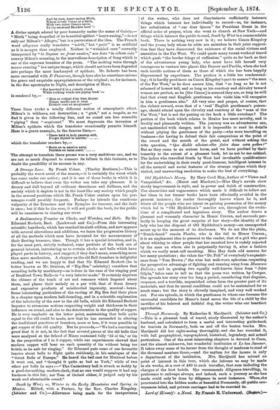A Rudimentary Treatise on Clocks, and Watches, and Bells. By
Sir Edmund Beckett, Bart. (Lockwood and Co.)—From this interesting scientific handbook, which has reached its sixth edition, and now appears with several alterations and additions, we learn the progressive history of all the methods which men have invented for the measurement of their fleeting treasure, time. Though it has a special intention, and is, for the most part, strictly technical, some portions of the book are of general interest, introducing us to certain clocks and bells which have played parts in history, and suggest, if they don't mean, something more than mere mechanism. A chapter on the old Bell-founders is delightful reading, and we are happy to find that Sir Edmund Beckett (he is better known as Mr. Denison, of "Big-Ben" celebrity) considers that sounding bells by machinery—as is done in the ease of the ringing peal of Bradford Town Hall—is "a very inferior mode." It certainly deprives the chimes of the touch of art and romance which lingered about them, and places their melody on a par with that of those dreary and expensive products of misdirected ingenuity, musical - boxes. Some iateresting particulars of the casting of- Big Ben find their place in a chapter upon modern bell-founding, and in a scientific explanation of the inferiority of the new to the old bells, which Sir Edmund Beckett imputes to erroneous notions respecting weight and thickness in their influence on sound, and also to the deterioration in the quality of copper. He is very emphatic on the latter point, maintaining that bells quite equal to the old could be made, now that he has succeeded in altering the traditional practices of founders, more or less, if it were possible to get copper of the old quality. But he procceds,—"We had a convincing proof that it is not, in the fact that several pieces of the old bells that were analysed at the School of Mines contained fully 25 of tin,' or tin in the proportion of 1 to 8 copper, while our experiments showed that modern copper will bear no such quantity of tin without being too brittle to be safe for ringing." Sir Edmund puts some of our favourite fancies about bells to flight quite ruthlessly, in his catalogue of the "Great Bells of Europe." He heard the bell oast for Montreal before it went out, and "thought it quite as bad as York," while of two other pet bolls he says :—" The Canterbury hell is struck so feebly by a good-for-nothing modern clock, that no one would suppose it had any business in this list ; nor Tom of Oxford either, if judged only by his weak and abominable sound."






























 Previous page
Previous page